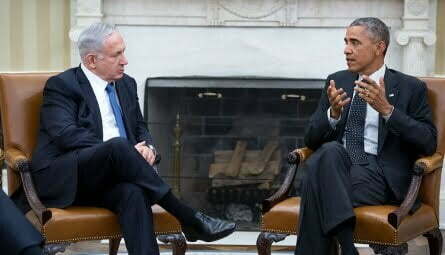“I try not to pat myself too much on the back, but this administration has done more for the security of the state of Israel than any previous administration,” U.S. President Barack Obama told an assembled group of Jewish-American campaign contributors this week, “We don't compromise when it comes to Israel's security … and that will continue.” The emphasis of his remarks evokes a new study entitled Israel: A Strategic Asset for the United States published by the Washington Institute for Near East policy, a D.C.-based pro-Israel think-tank, a “featured report” challenging the conventional wisdom on the bilateral alliance. I want to discuss both the content and reception of this study to evaluate its role in the continuing debate on U.S.-Israel relations.
Co-authored by Washington insiders Robert D. Blackwill and Walter B. Slocombe, experienced hands in Republican and Democratic administrations (respectively), the team approach is surely intended to assure readers of the bi-partisan nature of this analysis. A superficial examination of the document would suggest a balanced, professional, and accessible piece to both professional and lay audience.
The report opens with the assertion that “Israel is a small country in a strategically vital — and increasingly inhospitable region in the world,” yet, given the tensions that the bilateral ties often provoke with other Middle Eastern countries, “it is not surprising that doubts over the wisdom of the United States’ close relationship with Israeli periodically surface.” In contrast to other studies which have argued for shared “values” and “morality” in justifying the continuity of the so-called special relationship, Blackwill and Slocombe suggest that this view is “incomplete.” While these “remain the unshakable foundation of those ties, but the relationship stands equally on this underappreciated third leg: the common national interest.”
Taking a page from every administration since the 1970s, the authors highlight shared challenges like blocking nuclear proliferation, combatting terrorism, encouraging democratic change, curbing Iranian power, ensuring the flow of cheap oil, and resolving the Arab-Israeli conflict. Lo and behold, the authors contend, Israel’s own strategic interest is serendipitously similar! “Indeed,” they opine, “there is no other Middle East country whose definition of national interests is so closely aligned with that of the United States,” over the past thirty years. Unfortunately, few specific examples are offered to substantiate this thesis — and even those presented are questionable, such as the likely unauthorized nuclear strike against Syria. Later, the authors are forced to concede that “we do not argue that Israel’s assistance to the United States is more valuable to the United States than American support of Israel is to Israel,” and that ultimately, the U.S. is also looking to strengthen its other ties in the region. In the meantime, however, the authors conclude by calling for a stronger recognition of shared national interests and to “expand” the partnership into new cooperative realms.
The stir caused by this report seems surprising given its derivative and limited nature. It appears as a belated attempt to respond to the Israel Lobby controversy of 2007 (Walt and Mearsheimer), which attacked the Washington Institute explicitly for promoting a bi-lateral alliance that endangers U.S. national security. It seems too little and too late to redeem this image in the eyes of the general public, so the findings of the report can only preach to a choir of American-Jewish conservatives, Congressional sycophants, and perhaps defense contractors.
More troublingly, the reliance on a strategic argument does not seem to be in the national interest of either nation. While the shift toward strategic interests may be recognition of realities in the region, if the Arab spring has taught both the U.S and Israel anything, it is that the hearts and minds of the people matter more to long-term U.S. national security than arrangements with unsavory leadership. Now is the time to be talking tough with the Netanyahu administration, instead of turning a blind eye to an unacceptable ultra-nationalist agenda in the name of strategic partnership. If the United States truly wants to facilitate a democratic transition in the Middle East that will protect U.S. national interests in the long term, resting U.S. foreign policy upon this shaky third leg in Israel — or anywhere else in the region — seems a policy designed to fail soon.
















